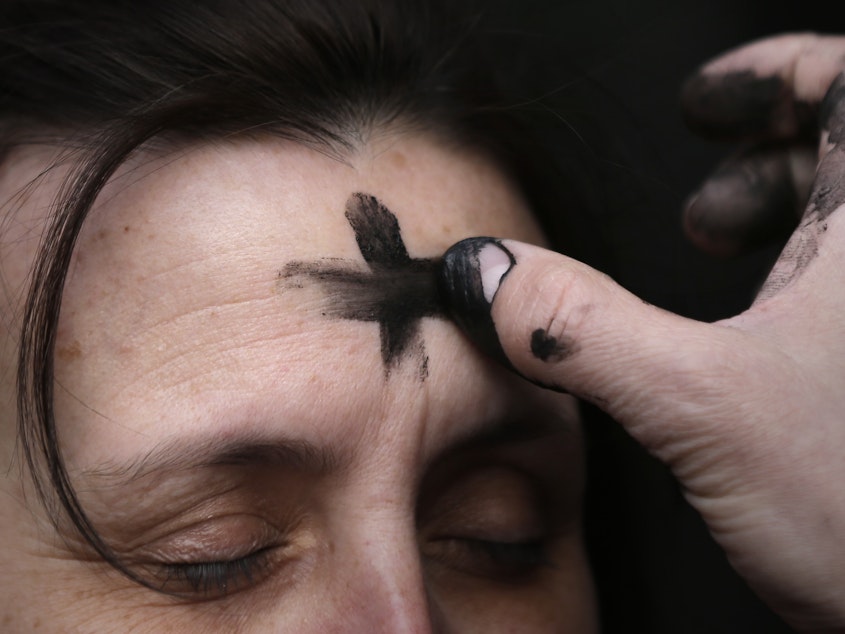Ash Wednesday Brings A 'Welcome Honesty' To Discussions About Mortality

The beeping of machines, the bandages, and the blood make the Intensive Care Unit in any hospital a difficult place.
Chaplain Fernando Serna walks the halls of Oregon Health and Science University, providing spiritual counsel and trying to bring some comfort.
"A sick person is facing the demise of their body, the smells of their body," Serna acknowledges. "And their families can't really turn away from that either."
And Serna helps them face some difficult truths.
"One of my privileges in the hospital is I facilitate conversations with patients and families when it becomes clear that this road is only leading towards an end of life."
Serna says death is usually sanitized, and we try to avoid even talking about it.
As a hospital chaplain, he talks about mortality more than most people do. But today, Ash Wednesday, is one of the few days where the fact that we're going to die is said out loud and isn't related to illness. It's the beginning of the Christian season of Lent, and the traditional liturgy includes the admonition "Remember that you are dust, and to dust you shall return."
A history of sin
Historically, Lent was a time of repentance, but more and more churches are using the day to reflect on mortality itself.
In the early days of the church, people didn't need to be reminded of death. It was all around — these were the days of plagues, when many people didn't survive childhood. And Ash Wednesday was about repenting, for a special group of people called penitents.
Tim O'Malley, who teaches at Notre Dame University, explains that penitents were those who had committed one of "the big sins" — murder, adultery, and apostasy. During the season of Lent, these penitents were set aside from the congregation, fasting and atoning, and then welcomed back before Easter.
Over time, the church developed more occasions to receive penance. And the worship around Ash Wednesday changed.
"Starting in the fifth and sixth centuries," O'Malley explains, "it moves from just a season for penitents, to more broadly the whole church."
A movement toward mortality
Instead of isolating sinners, the entire community would receive a sprinkling of ashes on their heads and be reminded that they will all return to dust. It was supposed to sound ominous, according to theologian Ben Stewart.
"There were certainly times in the Middle Ages when it was almost like pronouncing a curse or a punishment on people. As if being a mortal creature was like Plan B."
Stewart is a professor at the Lutheran School of Theology at Chicago. He doesn't think death is punishment for sin; it is not because of the fall in Eden, and not because people's own bad choices. Things that are born just die, and they return to dust.
"These words are actually a kind of welcome honesty," he says. "That this is Plan A. That we are mortal creatures rightly returning to the earth, and that our culture actually doesn't give us that message often enough."
But it's still a hard message. And so, he says, we ritualize it, in order to face mortality together.
"This day of Ash Wednesday in many ways has taken on the kind of existential weight that regular funeral practices used to do," Stewart says.
Modern life doesn't stop for funerals as much as it used to. And even when people attend memorial services, or celebrations of life, there's often no body there. Theologian Thomas Long wrote in his book The Good Funeral: Death, Grief, and the Community of Care, increasingly the dead are "banned from their own funerals."
Ash Wednesday can be the closest many people come to a ritualized near-death experience. And the use of ashes — made from the palms of the previous year's Palm Sunday procession — makes it all the more real.
"The fact that we're putting ashes on each other," says Ben Stewart, "in a society where more and more people are committing our loved ones' bodies to the fire, to become ashes and bone fragment — there's a kind of resonance there."
Stewart says we want these mortal encounters. That's why Ash Wednesday is such a well-attended service, for both Catholics and Protestants. Because this brush with death — literally across the foreheads of everyone from the oldest members of the congregation to newborn babies — can anchor people in life.
And acknowledging mortality, Stewart says — in public, in community — doesn't have to be a curse. It can be an invitation to turn, and wonder, at the lives we choose to live.
"It allows people to kind of re-calibrate," Stewart says. "Who are we as a society of dust-creatures? Who do we want to be?" [Copyright 2019 NPR]

